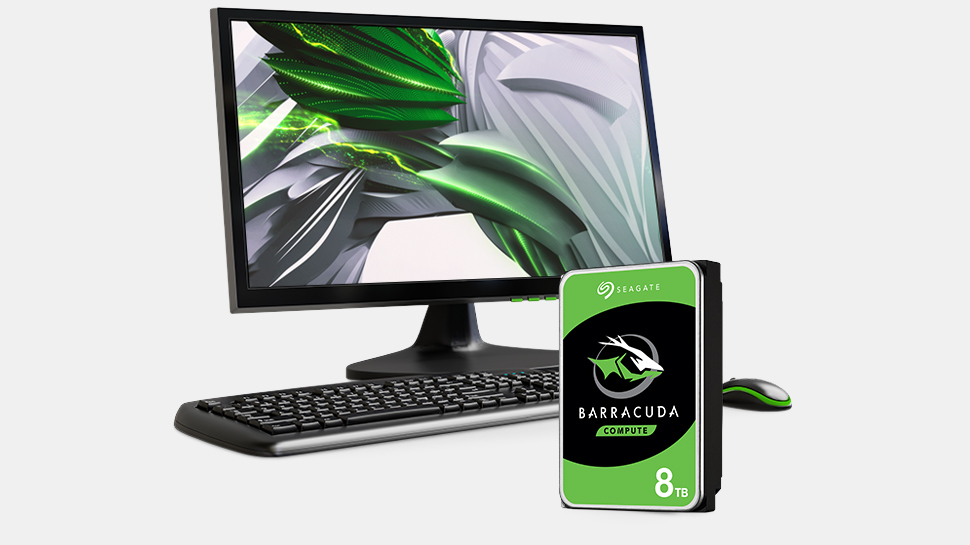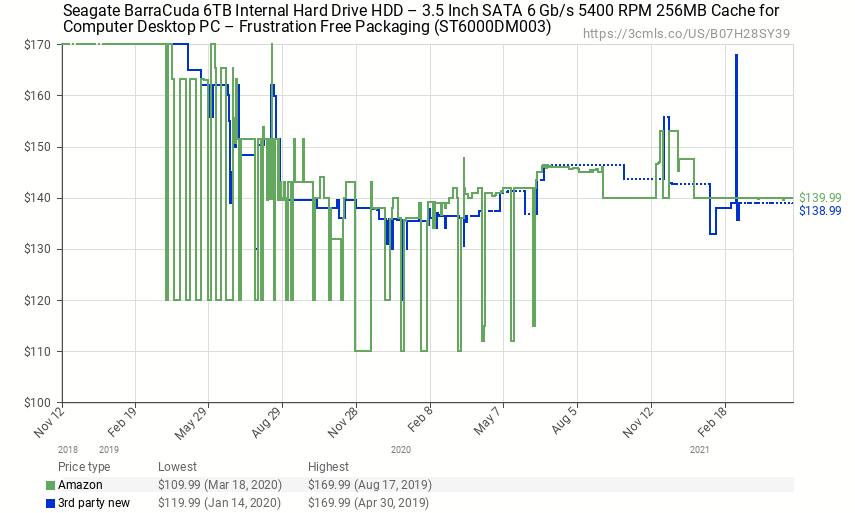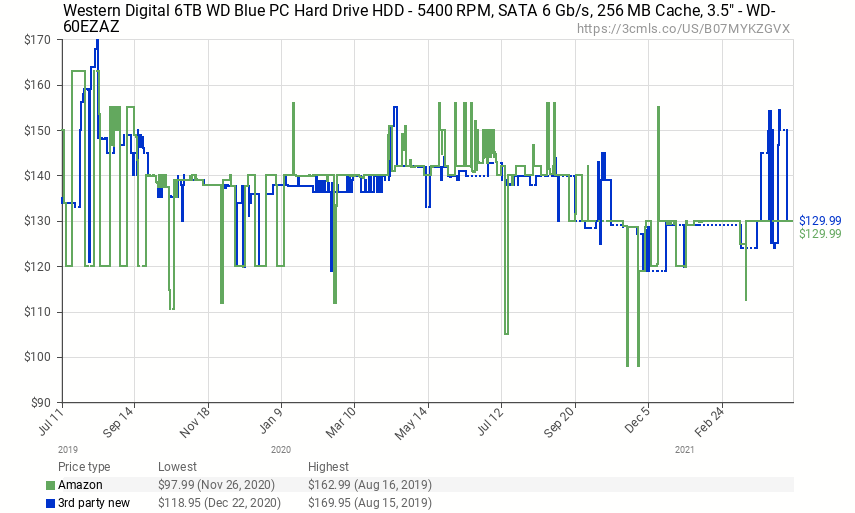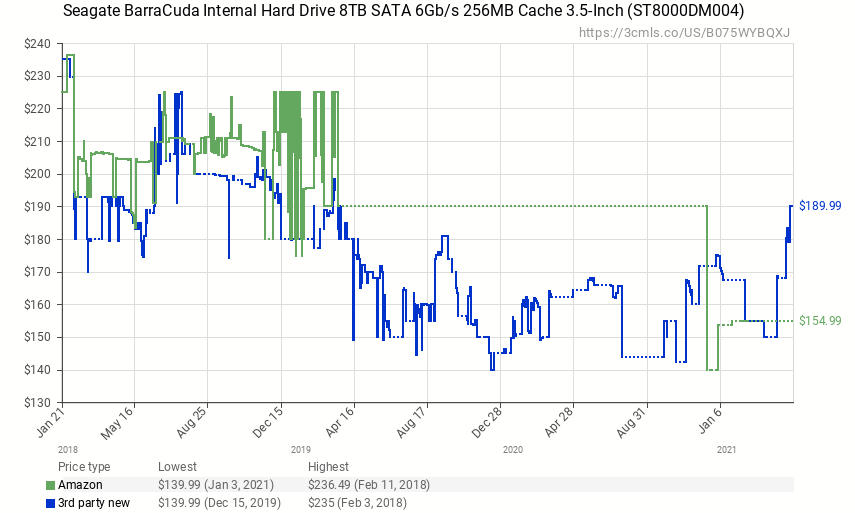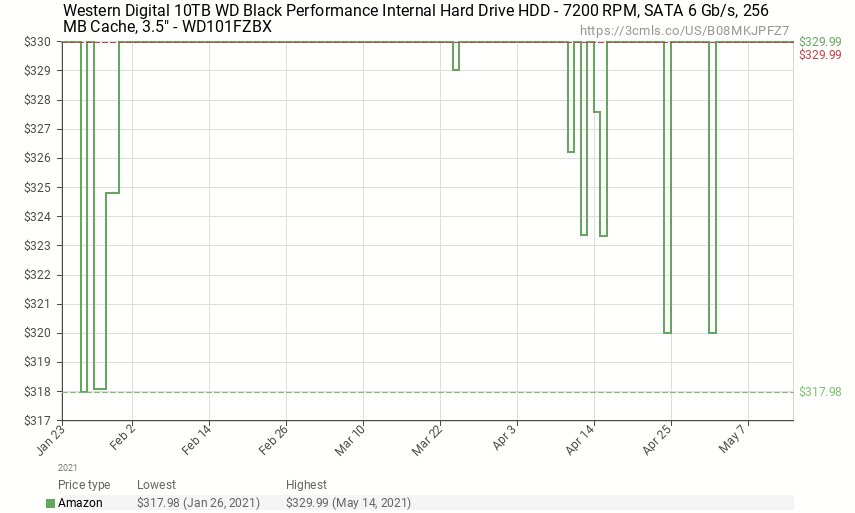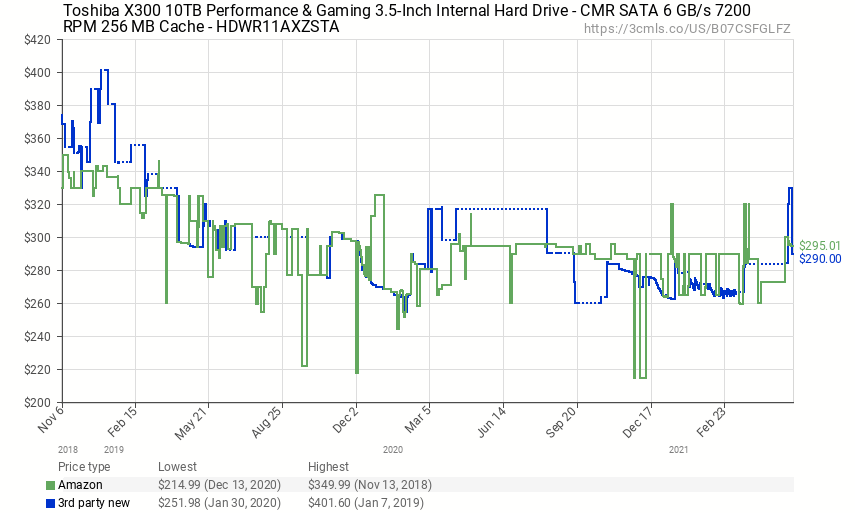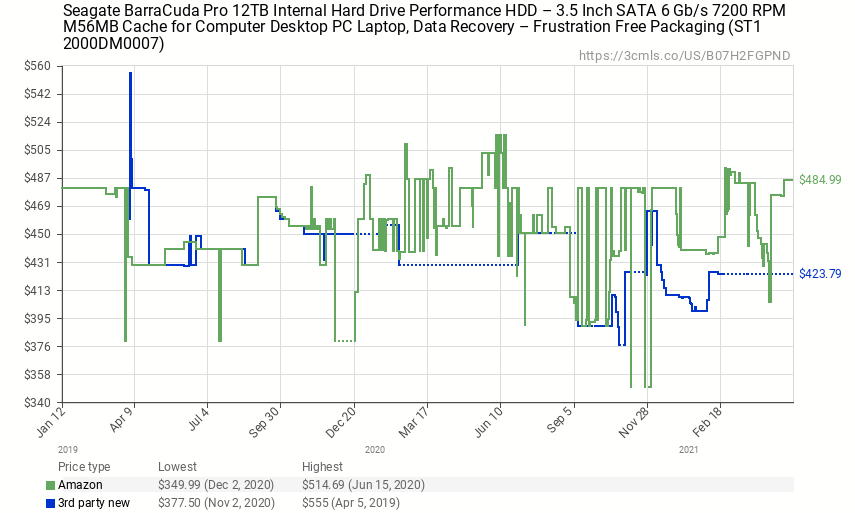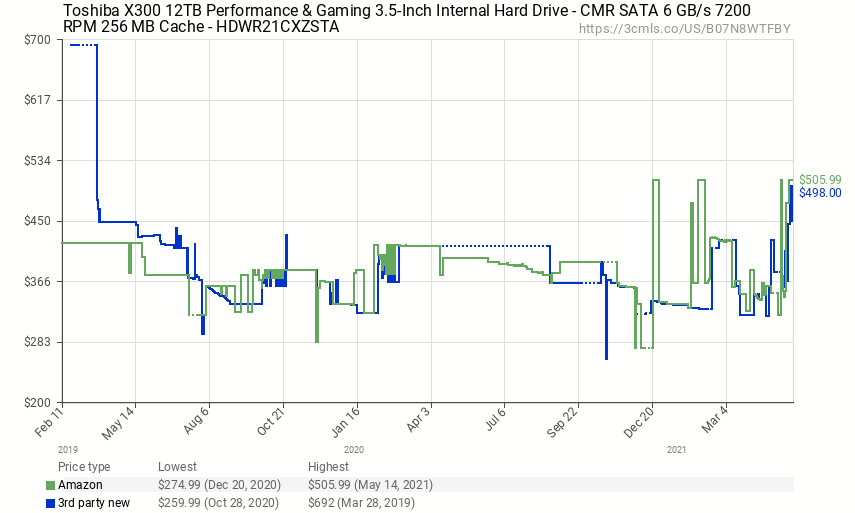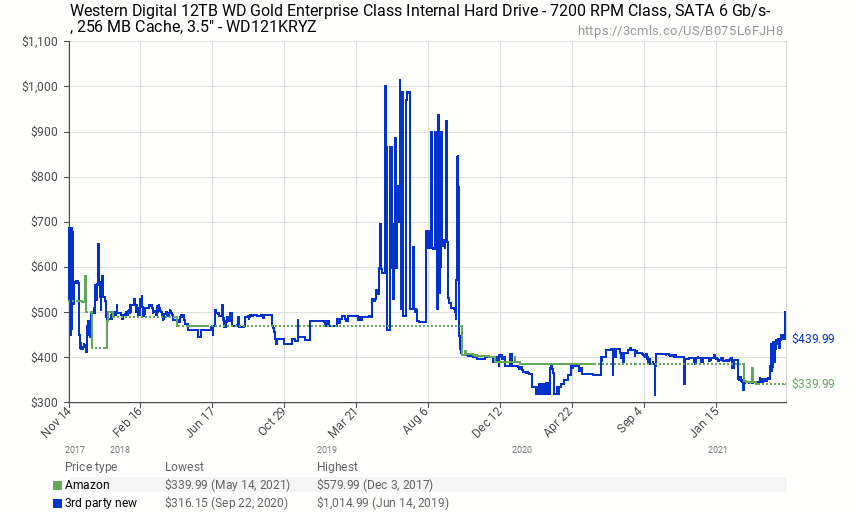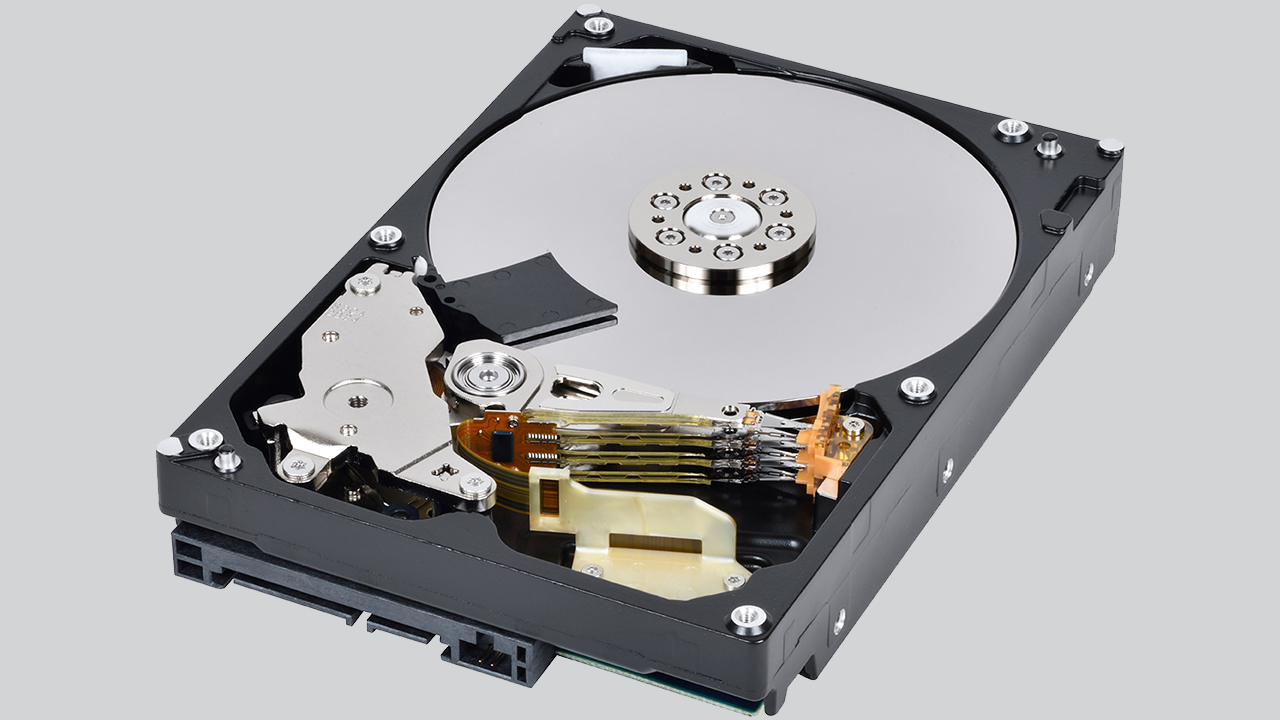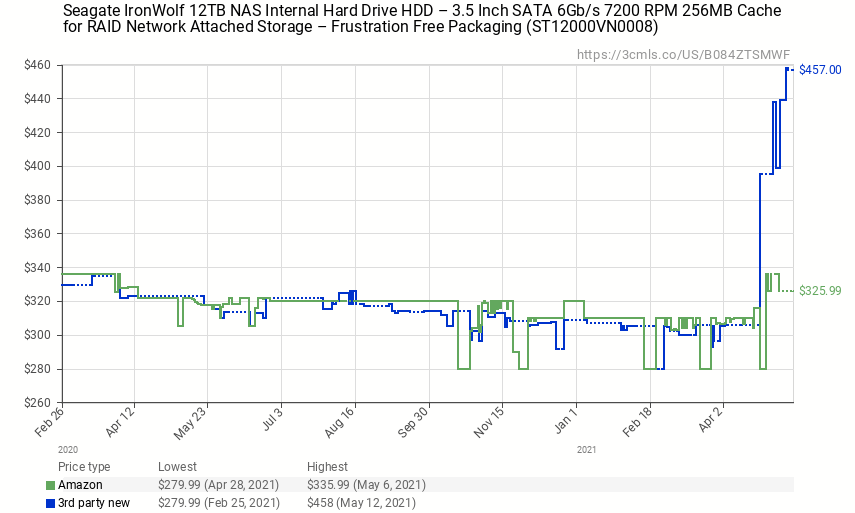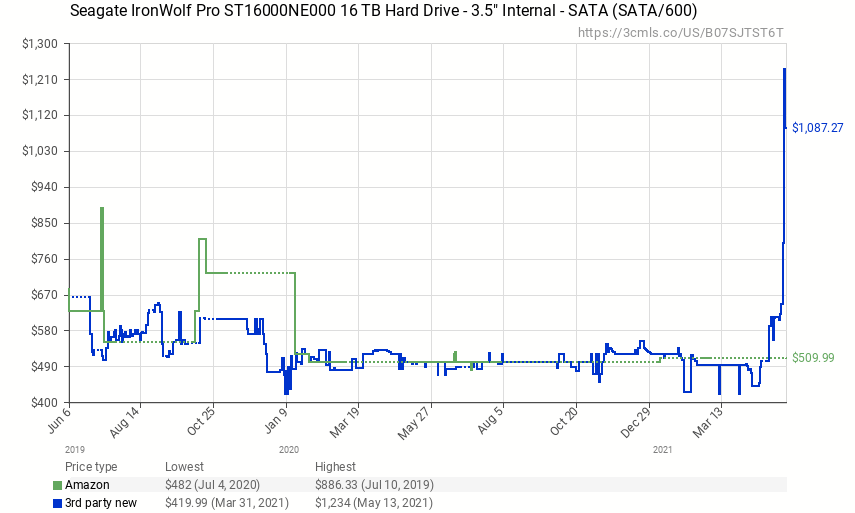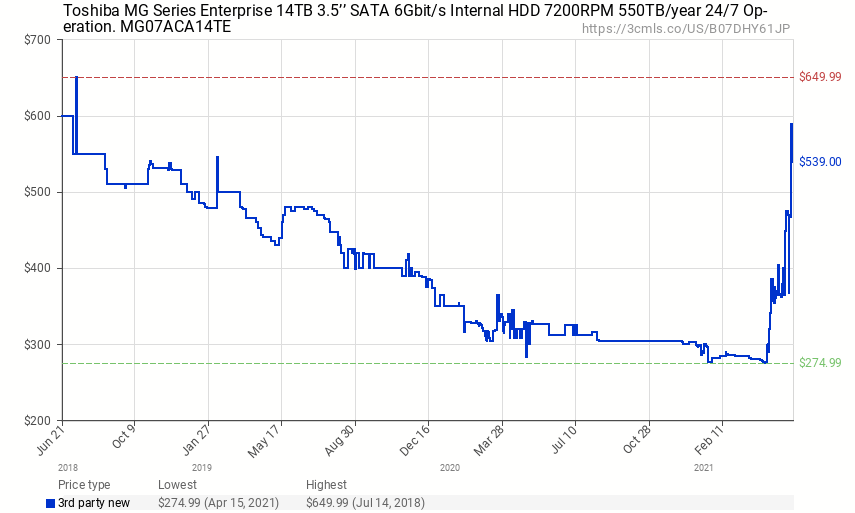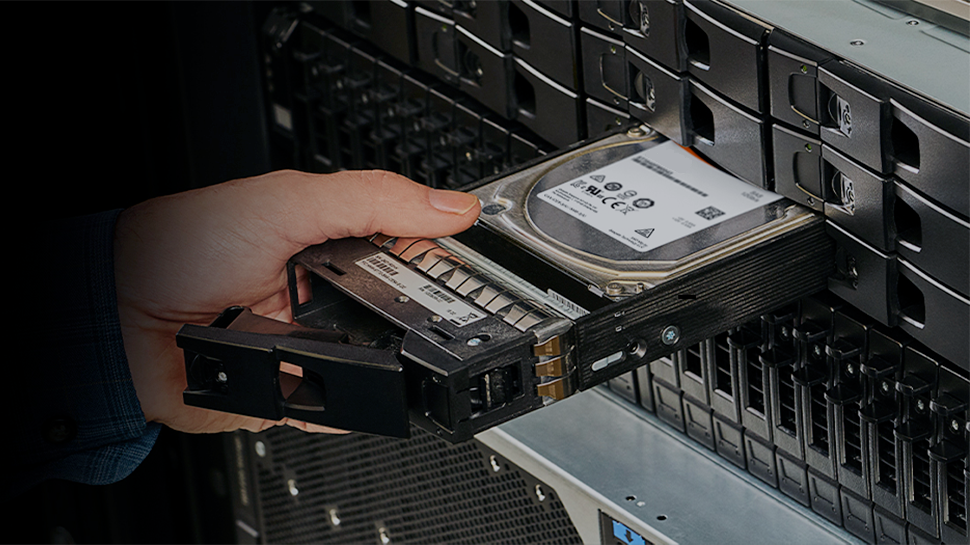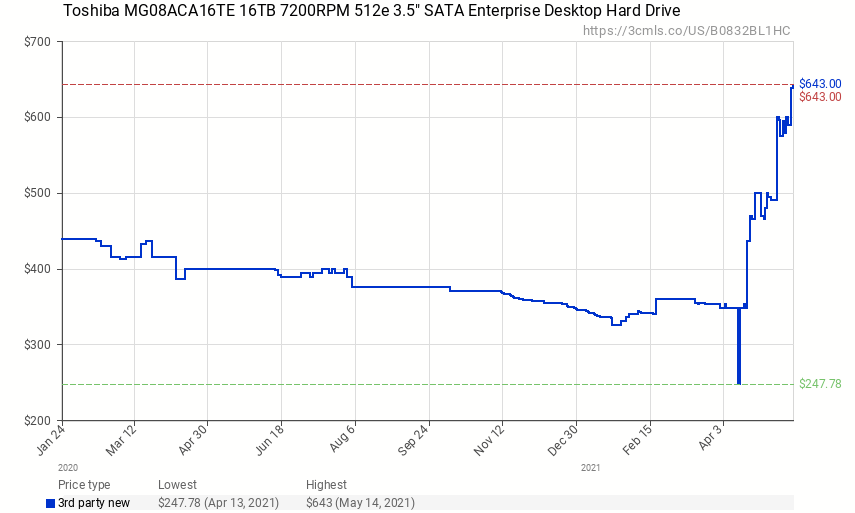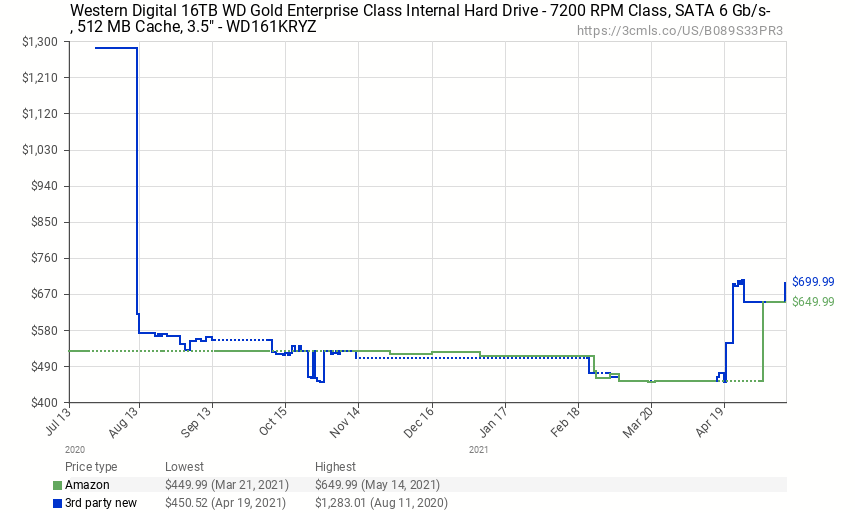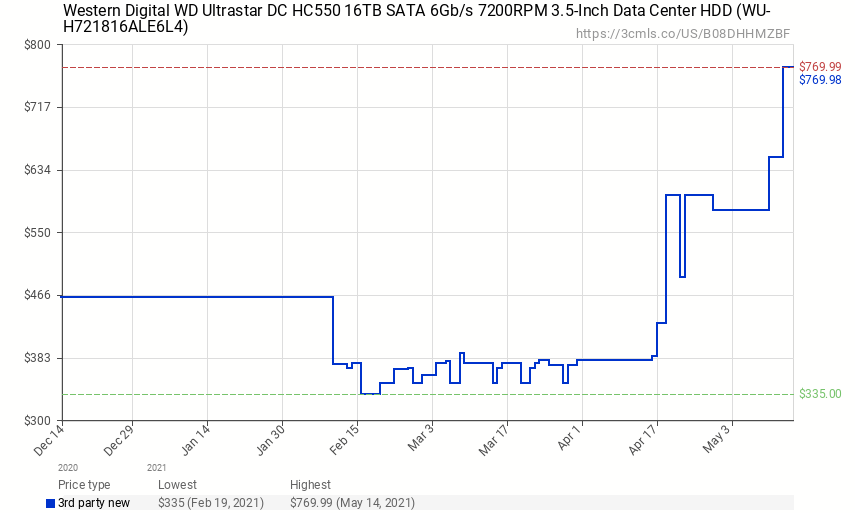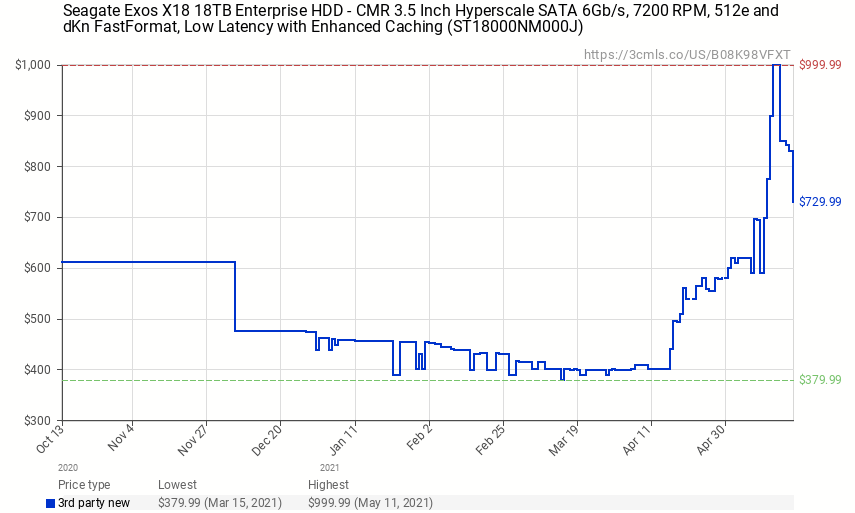Chia Coin Spurs HDD Shortage: Prices Up, High Capacities Sell Out
Chia goes nuclear
HDD pricing, particularly for high-capacity models, in the US is rising steeply as enthusiasm for Chia cryptocurrency farming grows. We've seen these same trends already with GPUs: The tight supply of graphics cards amid booming demand for PCs coupled with the ongoing Ethereum cryptomining obsession increased GPU pricing by at least twice the original MSRPs. Now it looks like something similar is happening with HDDs.
The number of hard drives sold each year has declined recently due to the migration of consumer PCs to SSDs, and also demand for higher-capacity HDDs by exascale datacenters. As a result, HDD makers no longer produce as many drives as they used to six or seven years ago (they have even adjusted production capacities to cut costs). Also, wholesalers and retailers no longer carry as many HDDs in reserve. Consequently, when demand for HDDs spikes, retailers sell out quickly, and prices increase as dealers come into play.
This is apparently what happened to the prices of HDDs in recent weeks as many popular models got $100, $200, or even $300 more expensive than they were just a few days ago. There are various reasons why the demand for hard drives is increasing. Still, considering how fast space allocated to the Chia network is growing (from 1 exabyte to 6 exabytes in about two weeks), we have every reason to believe that Chia cryptocurrency farming is a major factor that affects HDD availability and pricing in the channel and retail. Chia 'farmers' use all types of drives (mostly high-capacity models, though), so it is getting increasingly hard to buy a high-capacity HDD.
To get a more complete picture, we decided to examine the dynamics of HDD prices at Amazon.com using the CamelCamelCamel.com database. To do so, we took a look at how the prices of HDDs for desktops, NAS, and datacenters changed in recent months. We omitted specialty HDDs like those for surveillance because while it is possible to use them in PCs or for Chia farming, they are not designed for these workloads. We also preferred to examine the prices of newer HDD models. It is noteworthy that most of the drives we examined were not available directly from Amazon and were sold by various dealers, which usually means somewhat inflated prices.
Desktop Drives
People who buy an internal hard drive for a desktop computer tend to have diverse needs. Some need additional capacity to keep their photos and videos locally, so they don't really care about performance and are satisfied with inexpensive energy-efficient HDDs with a 5400 RPM spindle speed. Others not only need additional capacity but also demand a higher-performance drive to access their data faster. Therefore, we examined two categories of desktop HDDs.
Desktop HDDs: 6TB & 8TB, 5400 RPM, SMR
It is not easy to obtain an inexpensive 5400 RPM hard drive with predictable performance these days as most cheap HDDs use shingled magnetic recording (SMR) technology, meaning they aren't particularly friendly to random writes and rewriting in general. Same moderate-capacity drives are sometimes used inside branded DAS devices, so investigate before you buy if you think that SMR is not for you.
Since we are looking at higher capacity drives, we decided to examine cheap 6TB and 8TB models from Seagate and Western Digital. Toshiba does not seem to offer cheap DT02-series 5400 RPM/SMR HDDs in the USA at this point.
Get Tom's Hardware's best news and in-depth reviews, straight to your inbox.
Seagate's BarraCuda 6TB (ST6000DM003) has sold for around $140 for months and its price has not changed since the beginning of the Chia frenzy.
The price of Western Digital's WD Blue 6TB (WD60EZAZ) HDD has fluctuated significantly throughout its lifespan. In March it was available for about $115, but today it can be purchased for $130, which is not exactly a noticeable price hike given how unstable its price has been.
Seagate's BarraCuda 8TB (ST8000DM004) used to cost $140 in early January. Now it is available for $190.
Desktop HDDs: 10TB, 12TB & 14TB, 7200 RPM, CMR
Unlike cheap 5400 RPM desktop HDDs, 7200 RPM drives are based on conventional magnetic recording (CMR) technologies that do not use shingling (e.g., PMR, TDMR, etc.). Hence, these drives offer relatively high and, perhaps more importantly, predictable performance.
Both Seagate and Toshiba offer a wide range of 7200 RPM-class HDDs that use CMR (conventional magnetic recording) technology and offer capacities up to 14TB. By contrast, Western Digital's WD_Black tops at 10TB, so we used WD Gold models for higher capacities.
10TB
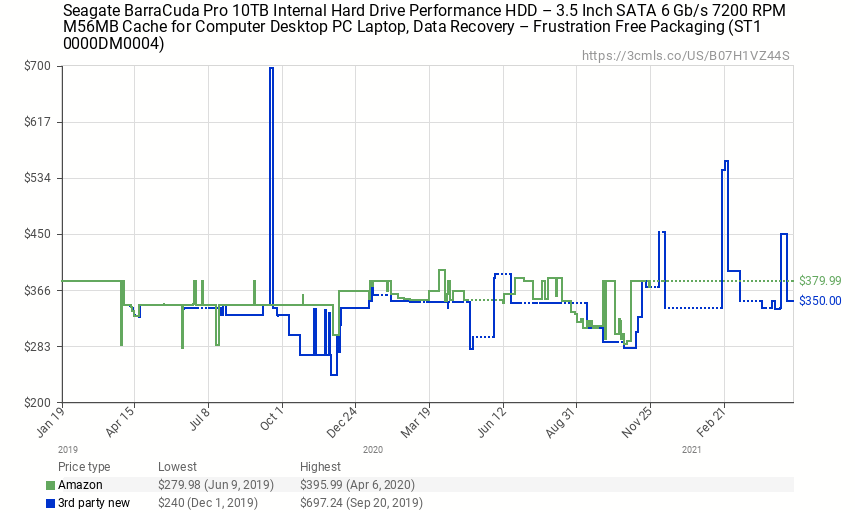
Seagate's BarraCuda Pro 10TB (ST10000DM001) was sold for around $350 several weeks ago. At the moment, it is priced at $380 when bought directly from Amazon and at $400 when acquired from its partners, an evident, yet not very significant price increase.
Western Digital's WD_Black 10TB (WD101FZBX) carries an MSRP of $330, but it was not available directly from the company at press time. Surprisingly, but it could be readily bought for $330 at Amazon (as of press time).
The price of Toshiba's X300 10TB (HDWR11AXZSTA) has been fluctuating from $260 to $290 for months, but increased to $320 – $330 at times. The drive currently costs $290 – $295, depending on the retailer, but the price may well rise or drop.
12TB
12TB and 14TB desktop HDDs are naturally more future-proof from a capacity point of view and are also a better fit for Chia cryptocurrency farming, so their prices actually changed more significantly than prices of lower-capacity models.
There is one exception, though. The Seagate BarraCuda Pro 12TB (ST12000DM007) hard drive has not changed much compared to previous months. Most of the time, the drive sold for around $480, but some lucky buyers could obtain it for $400 – $440. It is not in stock, but Amazon offers a pre-order for $485.
Toshiba's X300 12TB HDD (HDWR21CXZSTA) was recently priced at around $320 with some brief spikes. In the last couple of weeks, its price increased to $498 – $506 depending on the seller.
Western Digital's WD Gold 12TB (WD121KRYZ) used to cost around $340 in February and March, but now it is available directly from the company for $416. Meanwhile, it could be purchased for $440 at Amazon at press time.
14TB
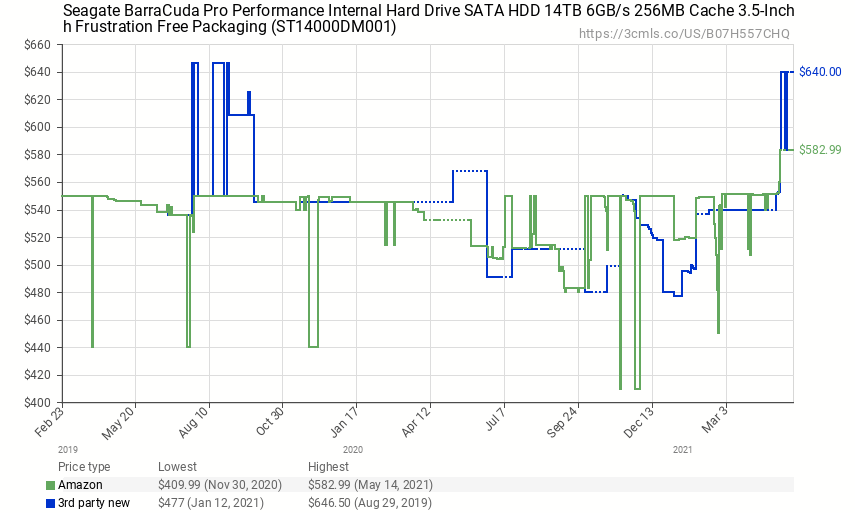
The pricing of Seagate's BarraCuda Pro 14TB (ST14000DM001) has shifted from $480 to $550 for months, but in the last few days, its price at Amazon increased all the way to $583 – $649, a clear indicator that demand is exceeding supply. At least the HDD is in stock at some dealerships.
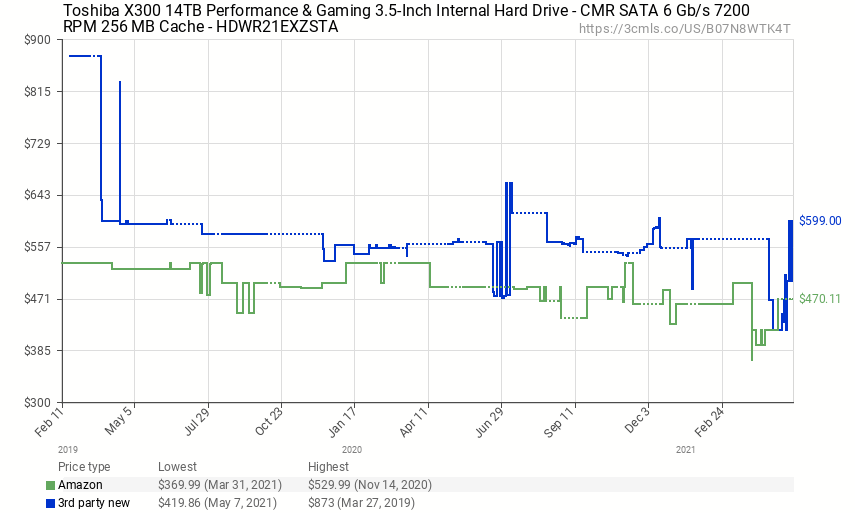
Toshiba's X300 14TB drive (HDWR21EXZSTA) has never been particularly cheap, but it was possible to get it from $470 to $500 in recent months (even for about $400 if you were lucky). Now it starts at $599.
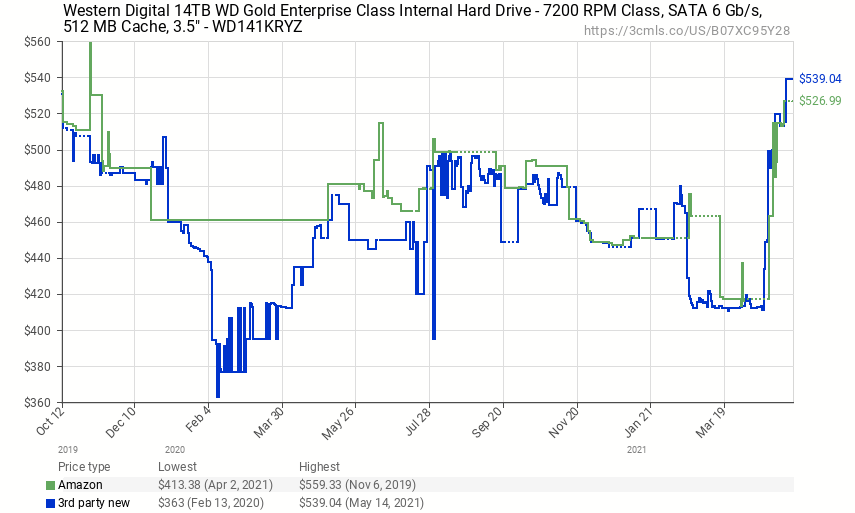
Being aimed at enterprises, Western Digital's WD Gold 14TB (WD141KRYZ) is not supposed to be cheap, which is why it sold for about $450 from November '20 to March '21, when its price dropped to $410. The price of this drive has gone upwards since mid-March, so now it is $527 – $630 at Amazon, if you're lucky. Meanwhile, Western Digital had these drives in stock at press time for $499.
NAS
Unlike desktop drives, NAS drives are designed for multi-drive environments, so they better handle vibration and other peculiarities of such setups. Just like with desktop HDDs, there are various types of NAS drives offering different performance levels and powered by either CMR (midrange and high-end SKUs) or SMR (entry-level drives only). Since the cheapest NAS drives use SMR, we prefer to focus on midrange and higher-end models that use CMR and have a spindle speed of 7200 RPM.
NAS: 8TB, 10TB, 12TB & 12TB+
Mainstream NAS HDDs are aimed at homes and small offices, they are designed for NAS with up to eight bays and are rated for up to a 180TB/year workload. Since very few people truly need to host loads of data at home, we checked relatively inexpensive 8TB, 10TB, and 12TB models that usually offer a combination of a reasonable price and decent capacity.
8TB
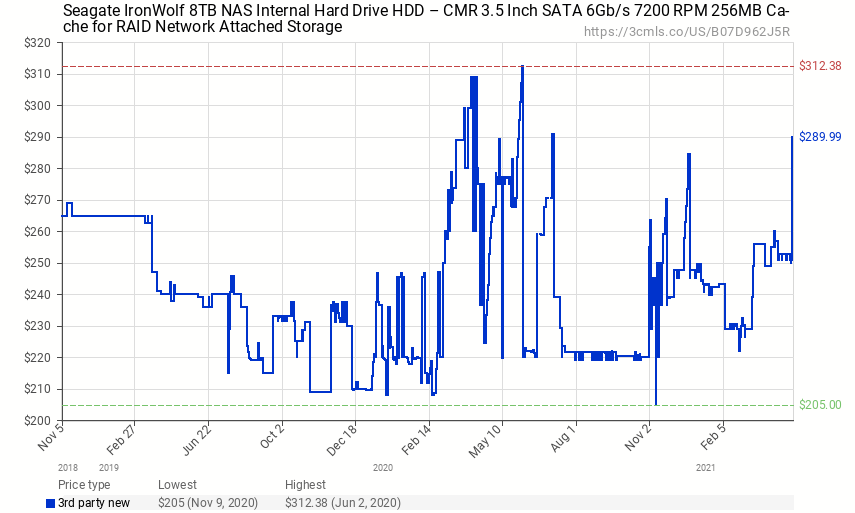
The pricing of Seagate's IronWolf 8TB (ST8000VN0022, CMR, 7200 RPM) has been fluctuating widely for the past year. In the last couple of weeks, it increased from $250 to $290. Perhaps that's because Seagate's IronWolf 8TB is not a particularly new HDD and it is rare in general.
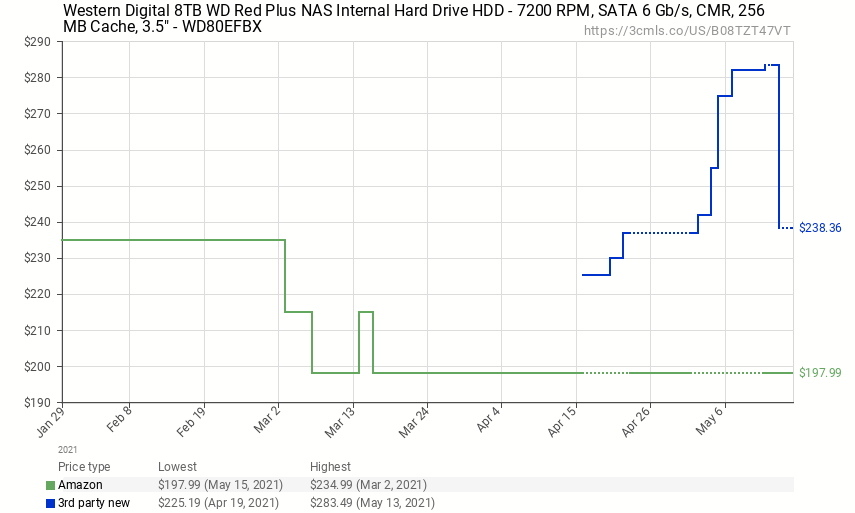
Western Digital's Red Plus 8TB (WD80EFBX, CMR, 7200 RPM) HDD has actually gotten cheaper this March and is now available at Amazon and Western Digital's online store for $198. There are some resellers trying to sell it for $238, though.
10TB
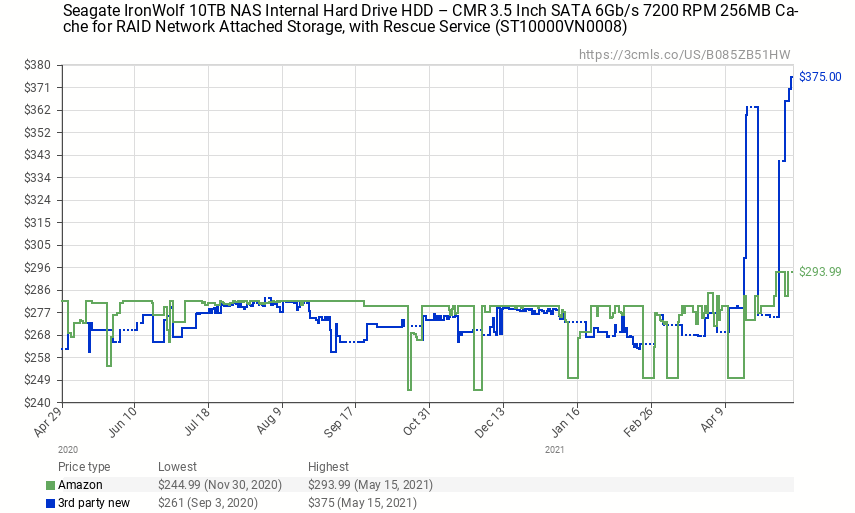
Amazon sold Seagate's IronWolf 10TB (ST10000VN0008, CMR, 7200 RPM) for about $280 from April '20 to April '21. Demand for this drive picked up this April and has increased to at least $375.
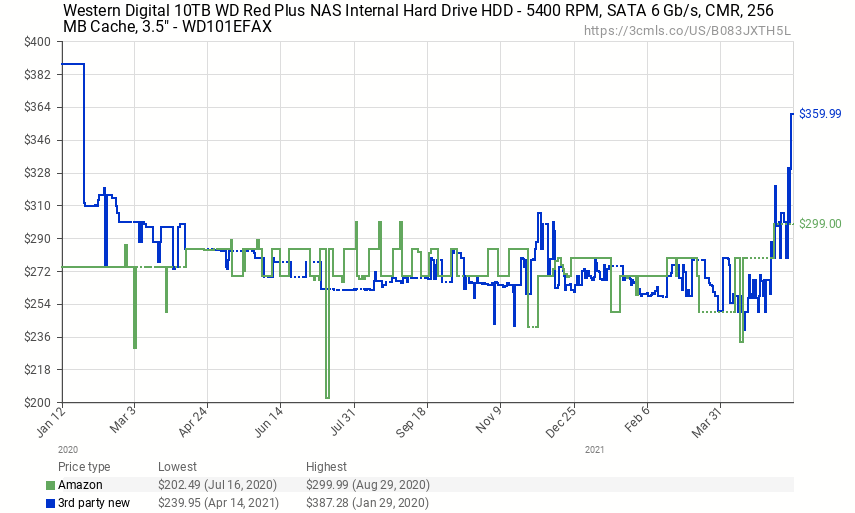
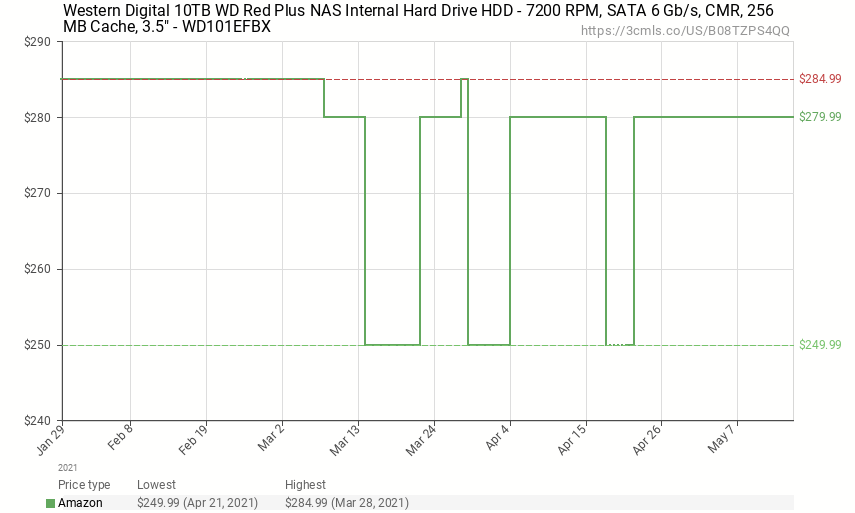
Western Digital currently sells two versions of its WD Red Plus 10TB HDDs (WD101EFAX, WD101EFBX, CMR, 7200 RPM) with similar performance levels. Pricing of both has been generally unstable but remained in the ballpark of $280. Today, a WD Red Plus 10TB can still be purchased for $280 directly from the manufacturer, whereas the model WD101EFBX can be pre-ordered from Amazon for $280. In contrast, the WD101EFAX is available at Amazon for $360 – $380.
12TB
Seagate's IronWolf 12TB (ST12000VN0008, CMR, 7200 RPM) was selling for around $310 until late April, when its price bounced. At this point, it can be purchased for $457.
Western Digital's WD Red Plus 12TB (again, we have two SKUs here, WD120EFAX and WD120EFBX, both are CMR, 7200 RPM) has an MSRP of $310, yet it is currently not available directly from the manufacturer at this price. It is also listed on Amazon with a $479 price tag. A note: the graph is not missing, it was simply not available at CamelCamelCamel.
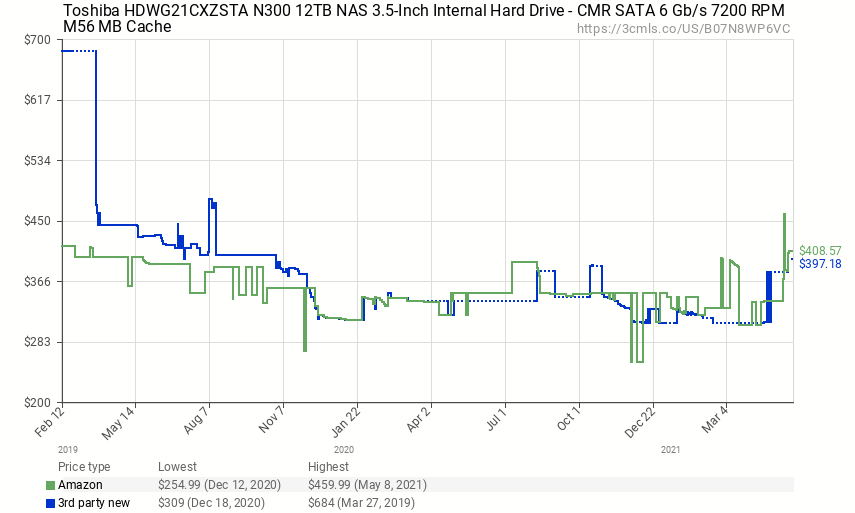
Toshiba's N300 12TB (HDWG21CXZSTA, CMR, 7200 RPM) could be had for $255 in December 2020, but with the recent price hikes as a result of overwhelming demand, the HDD is now priced at $397 – $409.
12TB+
Higher-end NAS drives are designed for business applications with up to 24 bays and are rated for up to 300TB/year workload. Advanced HDDs for NAS usually overlap with cheaper NAS drives in terms of capacity and performance, but are priced noticeably higher. They also overlap with slightly more expensive data center/enterprise drives in terms of capacity and features. As a result, the niche of Seagate's IronWolf Pro and Western Digital's WD Red Pro is pretty narrow. Furthermore, since these HDDs are aimed at businesses, most of such drives are sold in already populated NAS devices. As a result, it is not easy to track the prices of separate drives.
Seagate's IronWolf Pro 16TB (ST16000NE000) is one of the 'dream' NAS HDDs as it has all the reliability, endurance, and performance perks that the company can offer. It also comes with +Rescue data recovery plan. It has never been cheap, but you could buy it for about $500 throughout 2020 and early 2021. This May its price catapulted to over $1,000. Right now, one dealer offers it for $1,087. If you want something cheaper, an Amazon partner offers an IronWolf Pro 14TB (ST14000NE0008) for $848.
Toshiba's MG-series Enterprise Capacity HDDs are designed for data centers that run 24/7 and are priced accordingly. But at some point, pricing for such a drive quickly drops, making them viable candidates for all kinds of NAS applications and even for desktops/workstations. This is what happened with Toshiba's Enterprise Capacity 14TB (MG07ACA14TE) HDD that plunged to about $275 earlier this year. Unfortunately, rapidly escalating demand drove its price to $539, and at press time, one of the dealers offered it for $589.
Datacenter/Enterprise HDDs: 16TB & 18TB, 7200 RPM, CMR
Datacenter and enterprise hard drives are not exactly meant for client PCs, but they are often used for workstations because of higher workload ratings and because manufacturers actually test every drive before shipping, which adds peace of mind. Furthermore, they offer capacities not available with other lineups, a valuable advantage for a workstation. However, in recent weeks many consumers had to start looking at products like Seagate's Exos and Western Digital's WD Gold not because they are good, but because high-capacity HDDs for NAS and desktops were sold out.
16TB
Seagate formally has two base 16TB Exos drive SKUs: the latest-generation Exos X18 16TB (ST16000NM000J) and the previous-generation Exos X16 16TB (ST16000NM001G). The newer one is slightly faster, but it yet has to make it to the retail market, which is why we examined the X16.
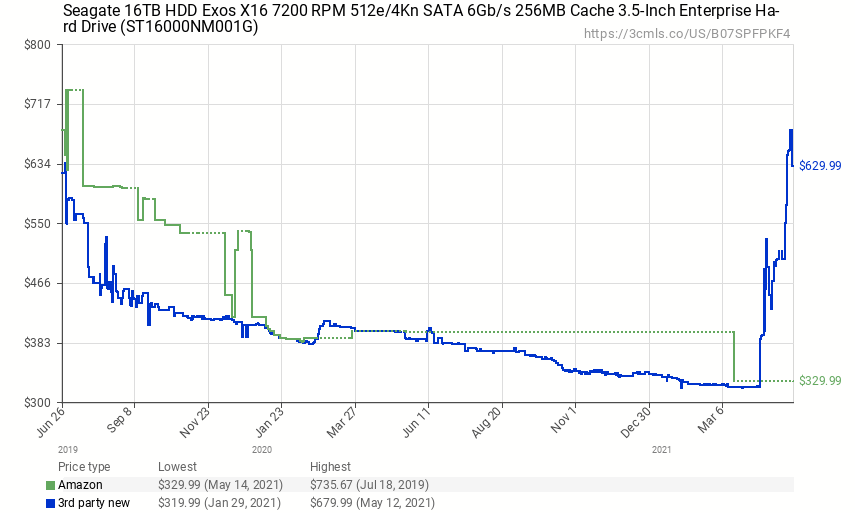
Up until mid-April, the pricing of Seagate's Exos X16 16TB has been on the decline and at times it was possible to get it for $330. Today, the drive is not available from Amazon, whereas resellers offer it for $660 and higher.
Toshiba's Enterprise Capacity 16TB HDD (MG08ACA16TE) has never been sold by Amazon itself, but various dealers sold it for $350 – $380 till mid-April. In just a month's time, the price of this drive increased to $643. But at this point, the HDD is not available from any of Amazon's partners.
The retail price of Western Digital's WD Gold 16TB (WD161KRYZ) was surprisingly stable throughout its life cycle. For months the drive was available for $520, then dropped to $450 this February. Unfortunately for buyers, its price rose to $650 – $700 in April, and then the product went MIA (at least as of press time). The good news is that Western Digital offers this drive for $600 on its website.
Western Digital also has a crème-de-la-crème lineup — the Ultrastar DC — for datacenters and exascalers. These drives are pretty rare in retail, which is why their price tends to be inflated. Nonetheless, earlier this year it was possible to get Western Digital's Ultrastar DC HC550 16TB (WUH721816ALE6L4) for around $380 at Amazon. Yet, because of the high demand for these drives, the price of this product skyrocketed to $770 before the stock was sold out.
18TB
18TB hard drives are the range-topping models these days as 20TB SKUs are only available to select customers. To that end, 18TB models are not even supposed to be reasonably priced.
Seagate's Exos X18 18TB (ST18000NM000J) retailed well below $500 for months, a very unusual situation for a top-of-the-line model. Yet, starting from April its price started to surge and at some point even hit the psychological $999.99. At press time, it was available from one dealer for $730.
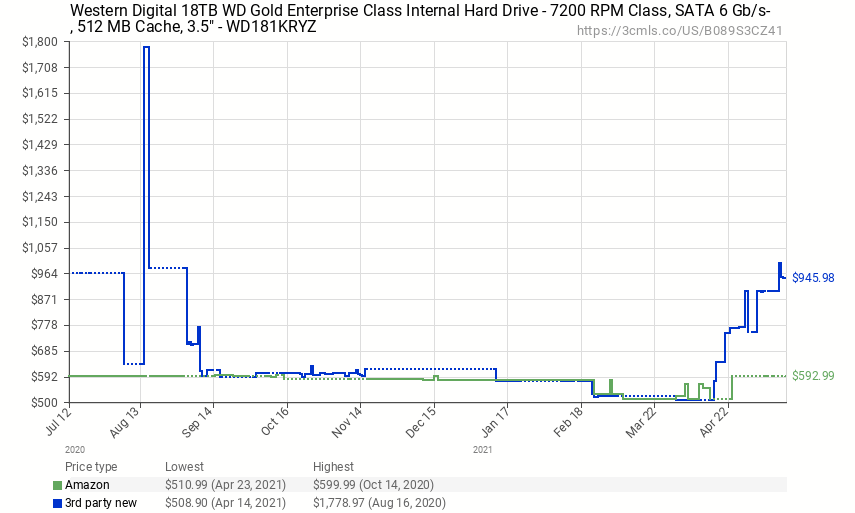
Western Digital's WD Gold 18TB (WD181KRYZ) was sold at $600 from September to late February when it dropped to $510. In mid-April, its price began its upturn and elevated to $946 in May. Meanwhile, even at such a high price, all units were sold out and the drive is not available either from Amazon or from Western Digital's online store.
Summary
All hard disk drives got more expensive in the last few weeks in retail because of generally high demand and the Chia cryptocurrency frenzy. Yet, prices of some HDDs increased just slightly, whereas prices of others truly skyrocketed.
Inexpensive models featuring a 5400 RPM spindle speed and SMR got marginally more expensive, possibly because people are not buying them too enthusiastically due to performance concerns. HDDs with capacities of 8TB and below did not get significantly more expensive in general, so those who are buying a new desktop computer and do not need loads of storage can get them without breaking the bank.
In contrast, high-performance high-capacity models got significantly more expensive. Select 10TB and higher-capacity models gained around $100, but in some cases prices got $250 ~ $350 higher. Meanwhile, range-topping16TB and 18TB models are either greatly overpriced or are sold out.
Western Digital stands out from other makers of hard drives with its online store that has dozens of attractive HDD SKUs available at their MSRP or at least at an honest price.

Anton Shilov is a contributing writer at Tom’s Hardware. Over the past couple of decades, he has covered everything from CPUs and GPUs to supercomputers and from modern process technologies and latest fab tools to high-tech industry trends.
-
gargoylenest why am I under the impression that all article related to one cryptoscam at a time are produce by people who invested in them and is trying to inflate their value by promoting them as much as they can so they can resale at easy and fast profit?Reply -
bigdragon Our elected representatives need to start representing and rein in the crypto currencies. A lot of users (particularly businesses and governments) can get by without needing a serious GPU. However, we all need storage. Shortages and big jumps in storage prices are not something we need right now.Reply -
Exploding PSU I used to joke around with my mates about mining using other parts of a PC, even something that isn't capable of doing calculations like hard drives or even PSUsReply
I know I shouldn't have tempted fate -
mogster Why exclude shingled drives? SMR is not a barrier to Chia farming.Reply
Also, you may want to look at SSD prices (especially NVME) since Chia needs them for temporary storage. -
ehush Don't the chip shortages contribute as well?Reply
The disks I've been watching have been affected more than the ones chosen in the article.
Increased from $135-155 to $230-235:
8TB Seagate Barracuda
https://camelcamelcamel.com/product/B07H289S7C
8TB WD MyBook (shuckable)
https://camelcamelcamel.com/product/B01LQQHLGC
8TB WD Elements (shuckable)
https://camelcamelcamel.com/product/B07D5V2ZXD -
NatalieEGH If I had the data space, I would consider selling my 16TB drives. I bought four set up as a spanned drive to use as a DVR on my computer. Unfortunately I am currently at 48TB usage and have no place to store my stuff. They are going for about 50% more than I paid for them.Reply -
SBRKR How can we get rid of chia? I don't think the author intended to screw up the hard drive market, but he did. Now people with money buy hard drives, and simple computer users suffer (like me).Reply -
gargoylenest Reply
sometime, I wonder how many author for well known magazine stocks on the crypto they are promoting as "the next big thing" before publishing?SBRKR said:How can we get rid of chia? I don't think the author intended to screw up the hard drive market, but he did. Now people with money buy hard drives, and simple computer users suffer (like me). -
bmeinhard57 This is a very frustrating situation that does not seem to be getting any better. I purchased 2 of the WD80EFAX 8 TB Red Plus drives on Oct 13, 2020 from Amazon.com for $169.99 each. I now need 2 more drives, but they now cost (11/2/2021) $350.00!!! each from a 3rd party seller. The newer WD80EFBX costs $209.99 and is out of stock. The first is an increase of 106% and even the less expensive one is an increase of 24%. This is crazy and this article certainly does not show how bad the situation really is.Reply
